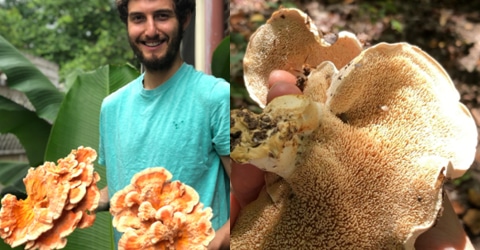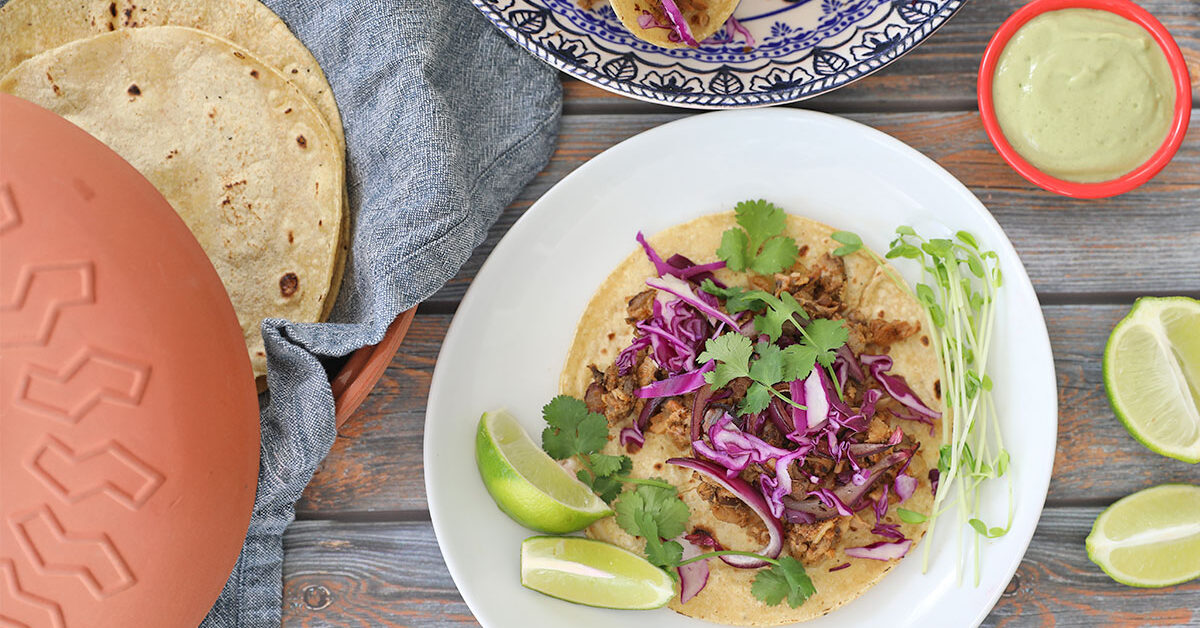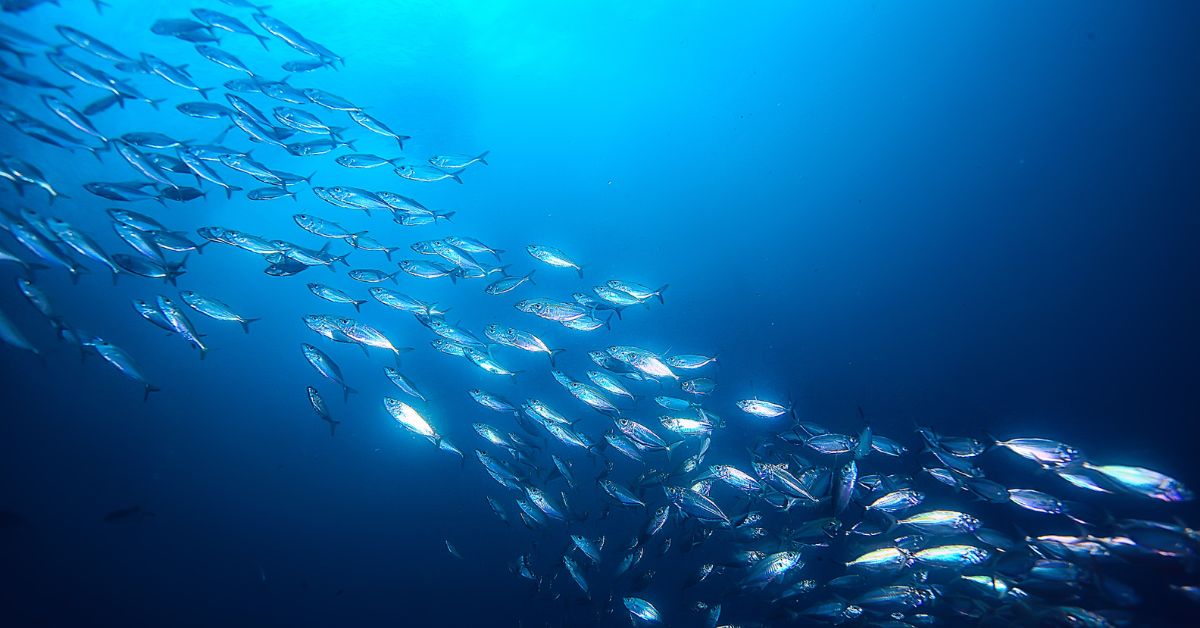
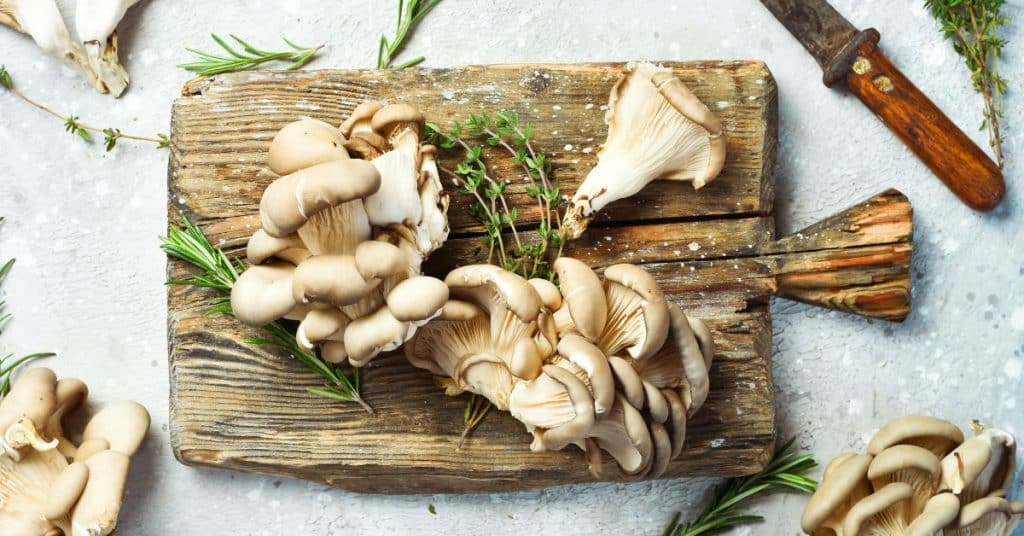
If you were to watch the documentary Seaspiracy and contemplate the state of the oceans, you might quickly wonder whether there are any healthy, sustainable seafood alternatives. The good news is that there are many such alternatives. As a whole food, plant-based (WFPB) forager, I have encountered mushrooms that mimic every animal product imaginable, from their texture, appearance, taste, and smell. For a meal I made at home, I prepared a foraged lion’s mane mushroom, Hericium erinaceus, that just so happened to look like a fish fillet. It was meaty, chewy, and alarmingly close to looking like a real fish. I know a few vegans who would have declined the meal on sight if they didn’t know where it came from!
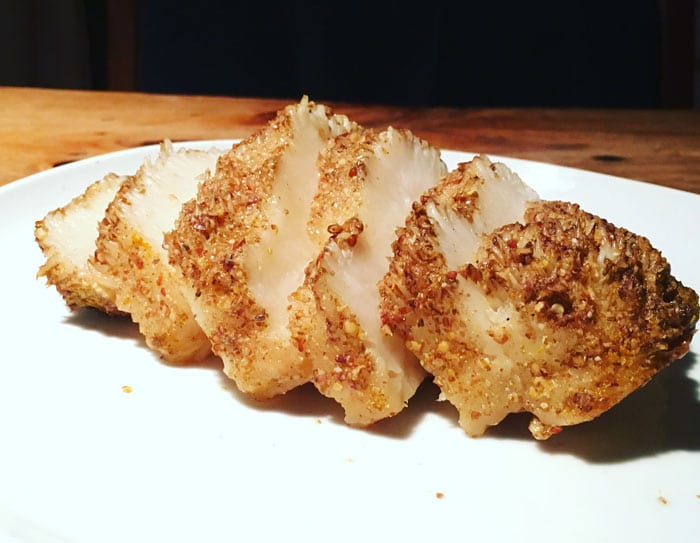
Where Can I Find These Mushrooms?
Some of the mushrooms I describe below have been cultivated by humans and can be found in stores or markets. Others can be foraged or purchased from a knowledgeable, generous forager. Check your local laws before foraging, as laws vary by park, state, and country. As always, do not eat anything that you cannot positively identify. To learn more about the foraging of wild foods near you, connect with local naturalists, mycologists, universities, and clubs!
Now that you are ready to explore fish alternatives, I am excited to present my top five mushroom-based seafood substitutes.
1. Oyster Mushrooms, Pleurotus spp., Replacement for Scallops, Shellfish, and White Fish
Time of Year: Year-round
Where to Find Them: Commonly cultivated, available in grocery stores
If you’ve ventured outside of the standard white button mushroom or portabella, there is a high likelihood that you’ve enjoyed an oyster mushroom. This mushroom is easy to find while foraging and relatively easy to grow. The oyster mushroom encompasses a wide range of species in the Pleurotus genus, and their taste and texture can vary. While eating fish might leave you with increased cholesterol, this delicious mushroom might lower your cholesterol. Pleurotus ostreatus (pictured below), a common mushroom in North America, contains up to 2.8% lovastatin by dry weight. When fed to rats, it lowered their serum and liver cholesterol by 33% and 27% respectively.[1]
While this is excellent news for rats, humans can likely experience similar benefits from eating more mushrooms and less fish. Saving the oceans and managing cholesterol has never been a more appealing venture.
Oyster mushrooms taste best when their gills are still white. As they age, they turn yellow and then brown and develop a strong fishy odor. Wild varieties taste different from cultivated varieties; they contain different nutrients and even have unique diets! While cultivated oyster mushrooms might be grown on sterilized grains or grasses, wild oyster mushrooms feed on decaying trees and nematodes.
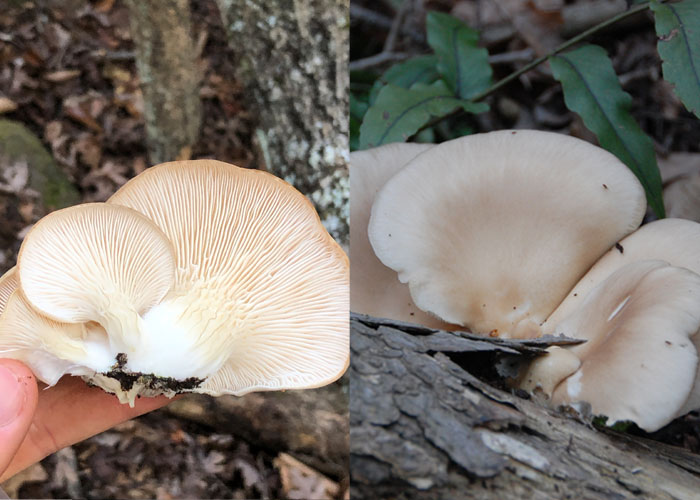
Left: Notice how the gills of Pleurotus ostreatus continue up the length of the stipe/stem. Right: Pleurotus ostreatus habitat — Look for dead trees near rivers and streams
2. Lion’s Mane Mushroom, Hericium spp., Replacement for Crab in Crab Cakes
Time of Year: Fall through spring
Where to Find Them: Commonly cultivated, available in some grocery stores, or from a grower
Hericium is another genus that is becoming increasingly popular in the United States. While lion’s mane has been used medicinally for centuries in Southeast Asia and Japan, people worldwide continue to seek out and purchase this mushroom for its medicinal qualities. Some of the documented health claims include the following:
- Antitumor and immune-modulating activities found in in vitro and in vivo research on esophageal, intestinal, pancreatic, and stomach cancers.
- Antihyperglycemic and antihypercholesterolemic activity.
- Neuronal growth activity.
- Antimicrobial activity.
- Antioxidant and anti-aging activities.[2]
While this mushroom continues to receive the focus of some experts worldwide, many of these health benefits are not confined solely to lion’s mane. Rather than focusing on reductionist research and consuming this mushroom for specific health benefits, I seek out the lion’s mane mushroom because I find it delicious, healthy, and beautiful. Although I have prepared this mushroom in many ways, “crab” cakes have won my heart.
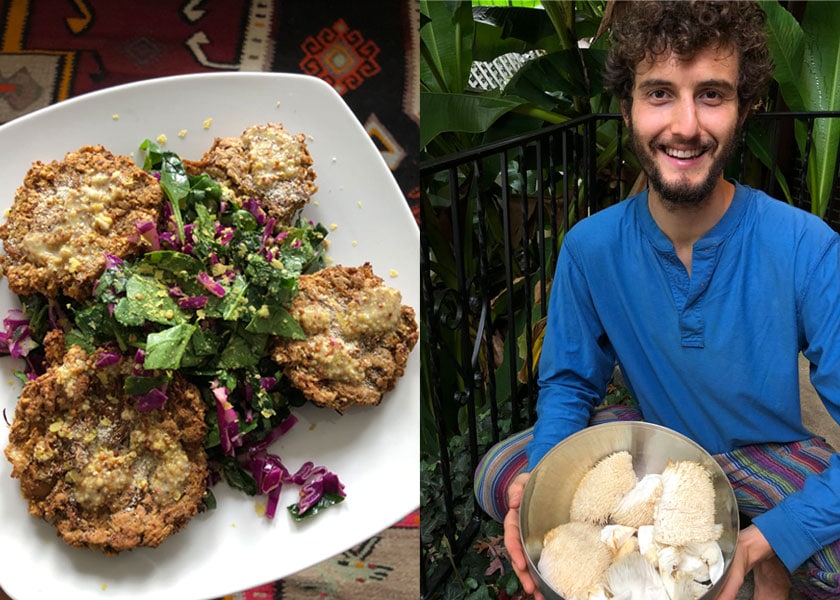
Left: Whole food, plant-based lion’s mane cakes Right: Winter lion’s mane harvested 20–30 feet in the air.
3. Maitake Mushroom, or Hen of the Woods, Grifola frondosa, Replacement for Lobster or Crab
Time of Year: Fall
Where to Find Them: Regularly cultivated, available in grocery stores
I first tried Maitake mushroom in a butternut squash curry, and it brought back childhood memories of lobster bisque. Before going vegan, I used to tell people that lobster was my favorite food. When pulled apart and cooked in balsamic vinegar and mustard, this was one of my favorite mushroom dishes yet! You can find these mushrooms cultivated, but they tend to be very small, whereas the wild versions can grow up to 10 or 15 pounds! I once found over 15 pounds of hen of the woods mushrooms, and at one point, my entire fridge was full of this mushroom. I had plenty to eat daily while also gifting it to friends, family, and even strangers. This mushroom can be challenging to find. For those new to foraging, learn how to find and identify this mushroom. There are no deadly look-alikes in North America. I commonly see this mushroom next to red oak trees in the early fall.
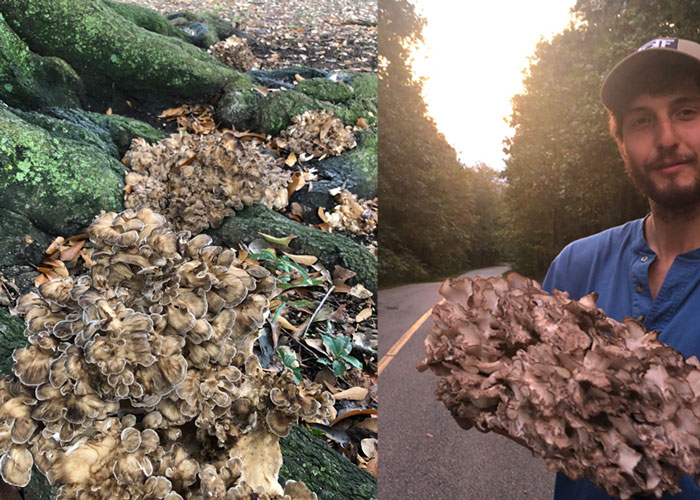
Hen of the woods spotted in an Atlanta park! You won’t find a maitake this size in your local grocery store!
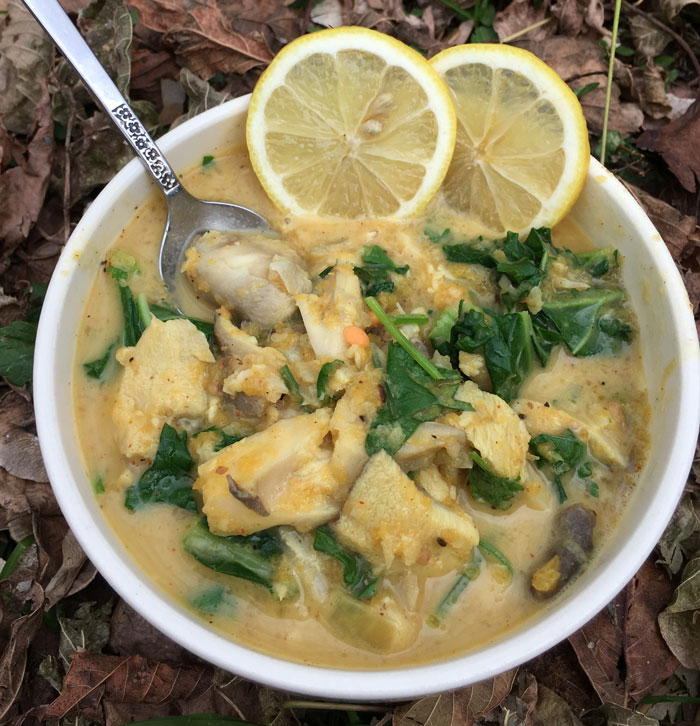
Lentil-curry hen-of-the-woods bisque
4. Cauliflower Mushrooms, Sparassis spp., Replacement for Calamari
Time of Year: Summer
Where to Find Them: Cultivated in Asia, available by wild foraging
The cauliflower mushroom is one of the most elusive and beautiful mushrooms on this list. My girlfriend’s parents sent me this photo asking for an identification. I instructed them to take the mushroom immediately, and they gifted half to me and kept half for themselves. The mushroom has the unmistakable texture of calamari. While I didn’t batter and fry this mushroom myself, I could see it replacing the squid market one day. While the cultivation of this mushroom is rare, there is research on cultivation in Korea, and I believe this mushroom will be more commonly produced in the coming years.[3]
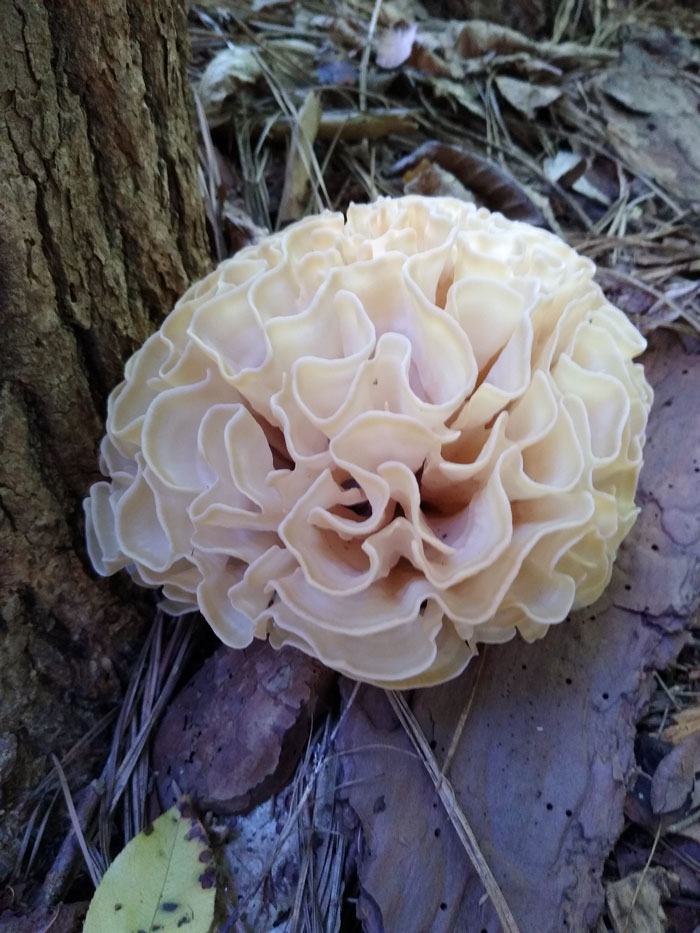
Sparassis spathulata foraged and photographed by Stephen Johnson
5. Young Chicken of the Woods, Laetiporus spp., Replacement for Chicken or Salmon
Time of Year: Spring through fall
Where to Find Them: Difficult to cultivate, available by wild foraging
As the name implies, this mushroom is a great chicken substitute. The mature specimen is often stringy and somewhat dry. It requires a nice marinade and goes well in BBQ chicken recipes. Last year was my first year finding a chicken of the woods, and I found not just one but seven different mushrooms, weighing nearly 20 pounds! I made a TikTok video to capture my incredible find, which resonated with many people as it was viewed over 346,000 times!
The young version of this mushroom is soft and light, easy to chew, and delicious. I cooked the water from the mushroom, and once I browned each side, I added lemon and pepper. It was delectable, and the texture reminded me of salmon or scallops while still young and tender.
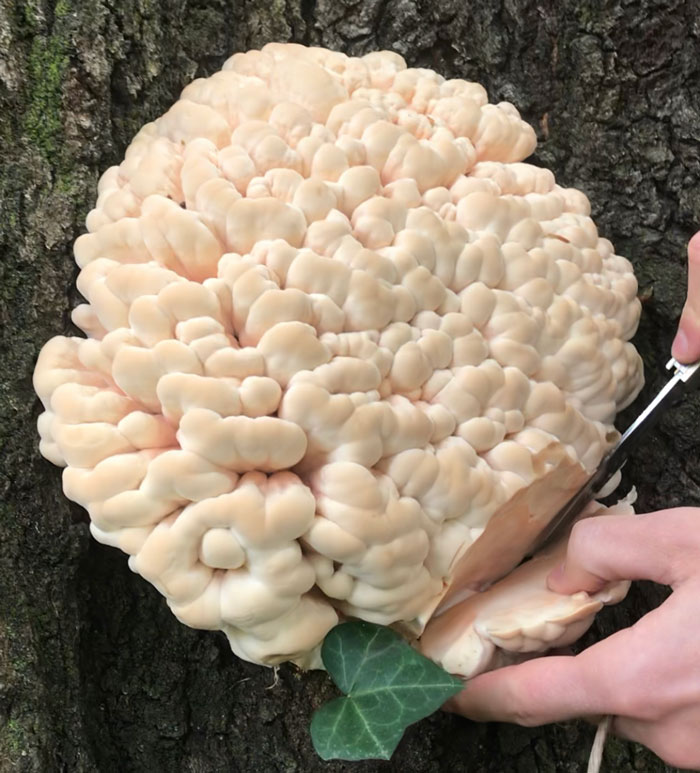
A young and large specimen of Laetiporus cincinnatus, or white-pored chicken of the woods
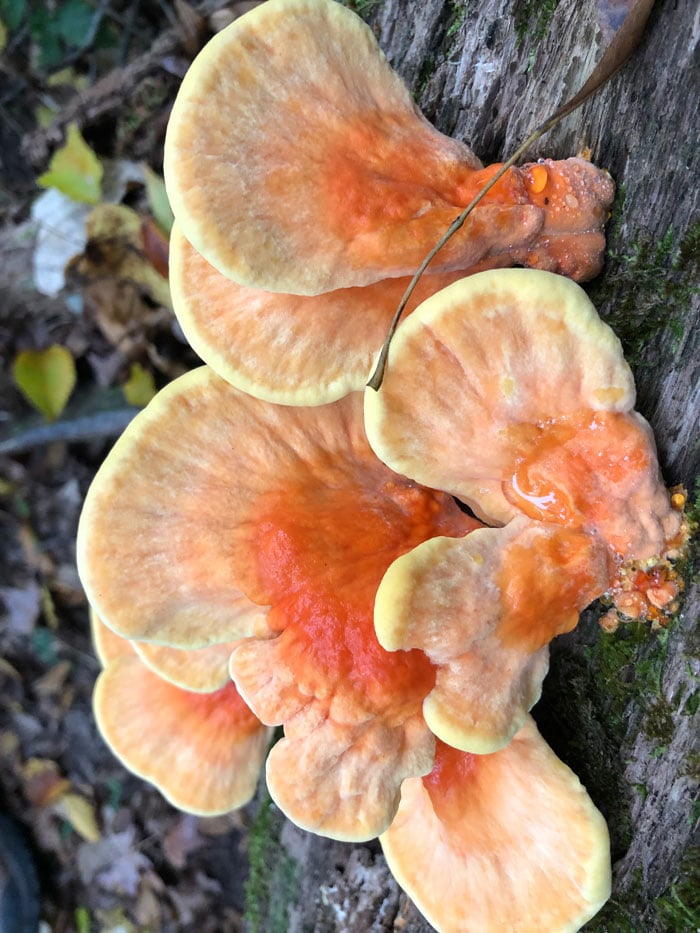
A young Laetiporus sulphureus, the yellow pored chicken of the woods
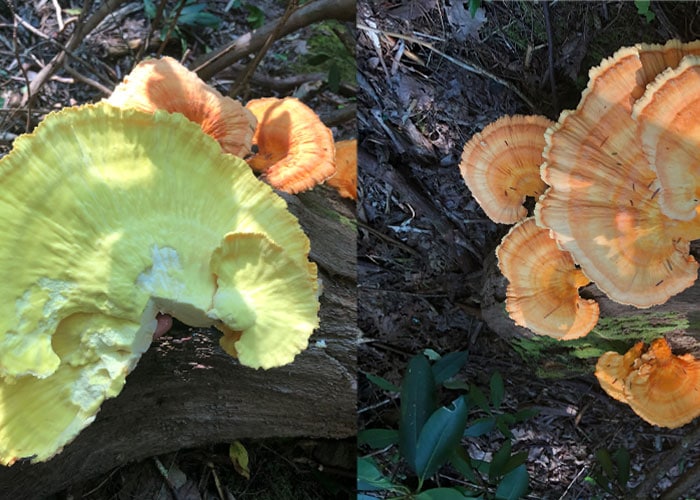
An older specimen of Laetiporus sulphureus, with a dry, stringy, chicken-like consistency
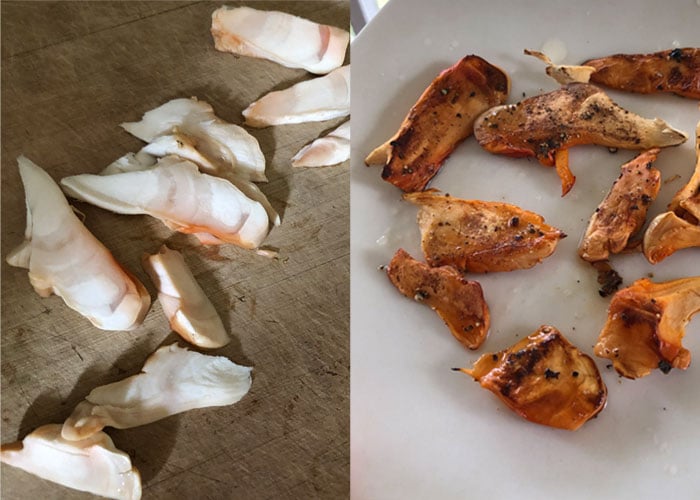
Young and tender chicken of the woods. Cooked Chicken of the woods, finished with lemon and black pepper
Our oceans need time to rest, regenerate, and heal. If you care about the state of our oceans and you want to do all that you can to help support the diverse and suffering ecosystem, start with your diet. Mushrooms can sustainably replace every type of seafood imaginable, from salmon to white fish, oysters to scallops, and crabs to squid. By removing fish from your diet and replacing it with mushrooms, you will experience a wide array of tastes and textures that mimic the consistency and even the taste of seafood without contributing to the destruction of the ocean. By finding mushrooms locally, either through foraging or buying from local sellers, you will be supporting the seas, your health, and the health of our planet.
References
- Abrams, D. I., Couey, P., Shade, S. B., Kelly, M. E., Kamanu-Elias, N., & Stamets, P. (2011). Antihyperlipidemic effects of Pleurotus ostreatus (oyster mushrooms) in HIV-infected individuals taking antiretroviral therapy. BMC Complementary and Alternative Medicine, 11 (60).https://doi.org/10.1186/1472-6882-11-60
- Thongbai, B., Rapior, S., Hyde, K.D. et al. (2015). Hericium erinaceus, an amazing medicinal mushroom. Mycol Progress 14,91. https://doi.org/10.1007/s11557-015-1105-4
- Park, H. Ryu, S. R., & Ka, K. H. (2011). Cultivation of Sparassis crispa on several kinds of medium density and particle size of sawdust-based medium made of Larix kaempferi. Journal of the Korean Wood Science and Technology, 39(1), 68–74.doi:10.5658/WOOD.2011.39.1.68
Copyright 2025 Center for Nutrition Studies. All rights reserved.
Deepen Your Knowledge With Our
Plant-Based Nutrition
Certificate
Plant-Based Nutrition Certificate
- 23,000+ students
- 100% online, learn at your own pace
- No prerequisites
- Continuing education credits


